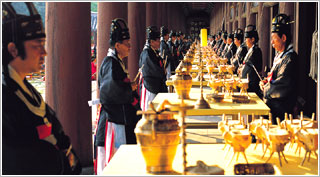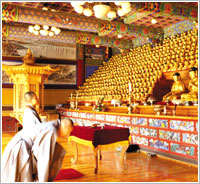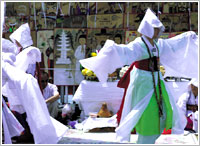 |
 |
|
 |

 Buddhism Buddhism
|
King Sosurim of Goguryeo received Buddhism in the fourth century (372 AD), which later had various effects on both Baekje and Silla, the results of which can be seen most profoundly on the culture, architecture, carvings, paintings and handicrafts of the time. Designated as a UNESCO World Heritage Site, the Bulguksa Temple and the Seokguram Grotto are considered to be representative works of art of Silla and are known throughout the world. |
Jikjisa Temple |
|
 Christianity and Catholicism Christianity and Catholicism
Christianity began to spread after a shipping treaty was formed between Korea and the United States in 1882. At first, believers were persecuted because Korean society felt they were in opposition to fundamental, Korean beliefs, but after seeing how Korean Christians were strongly opposed to the Japanese colonization of Korea, Christians were allowed the chance to share their beliefs, and little by little Christianity became accepted. At this time, it is reported that approximately 25% of the population of Korea is Christian, and Korean Christians are very proactive in sending missionaries around the world.
Catholicism however was received in Korea because of the study of the west. Korean envoys dispatched to other countries became interested in Catholic doctrine. They became the first Koreans to be baptized in Beijing in 1784, and they built a place of worship after returning to Korea. In spite of considerable persecution, many people accepted Catholicism, and currently there are over 2 million Catholic Christians in Korea.
|
|
|
Myeongdong Cathedral |
 Confucianism Confucianism

Jongmyo religious festival |
The fundamental doctrine of Confucianism is that moral virtue is of the utmost importance, and this ideology has been shared by Korea society since ancient times. Over the generations, it has been cemented in the minds of Koreans to the point where Korean people are still greatly affected by it today. Confucianism is a critical component in shaping Korean ethics and morals, lifestyles and national law. As Confucianism became the principal ideology of the Joseon Dynasty, it brought with it an increased interest in practical learning and in science and technology. It became deeply routed in the Korean psyche, and its continued influence on many points of etiquette and religious ceremonies and festivals can be seen up to the present day.
|
 Shamanism Shamanism
Shamanism deeply took root in Korea as a folk religion in ancient times, ever since praying for a good crop or for rain was closely connected to the livelihood of Koreans. A special characteristic of Korean Shamanism is the mudang’s role as intermediary in resolving problems. This characteristic can be seen in shamanistic services or gut, and to this day gut of various kinds are observed all over the nation. |
A gut where a mundang is doing a song and dance while offering a sacrifice. The meaning of this ceremony is to pray for good fortune for society and mankind. |
|
|








